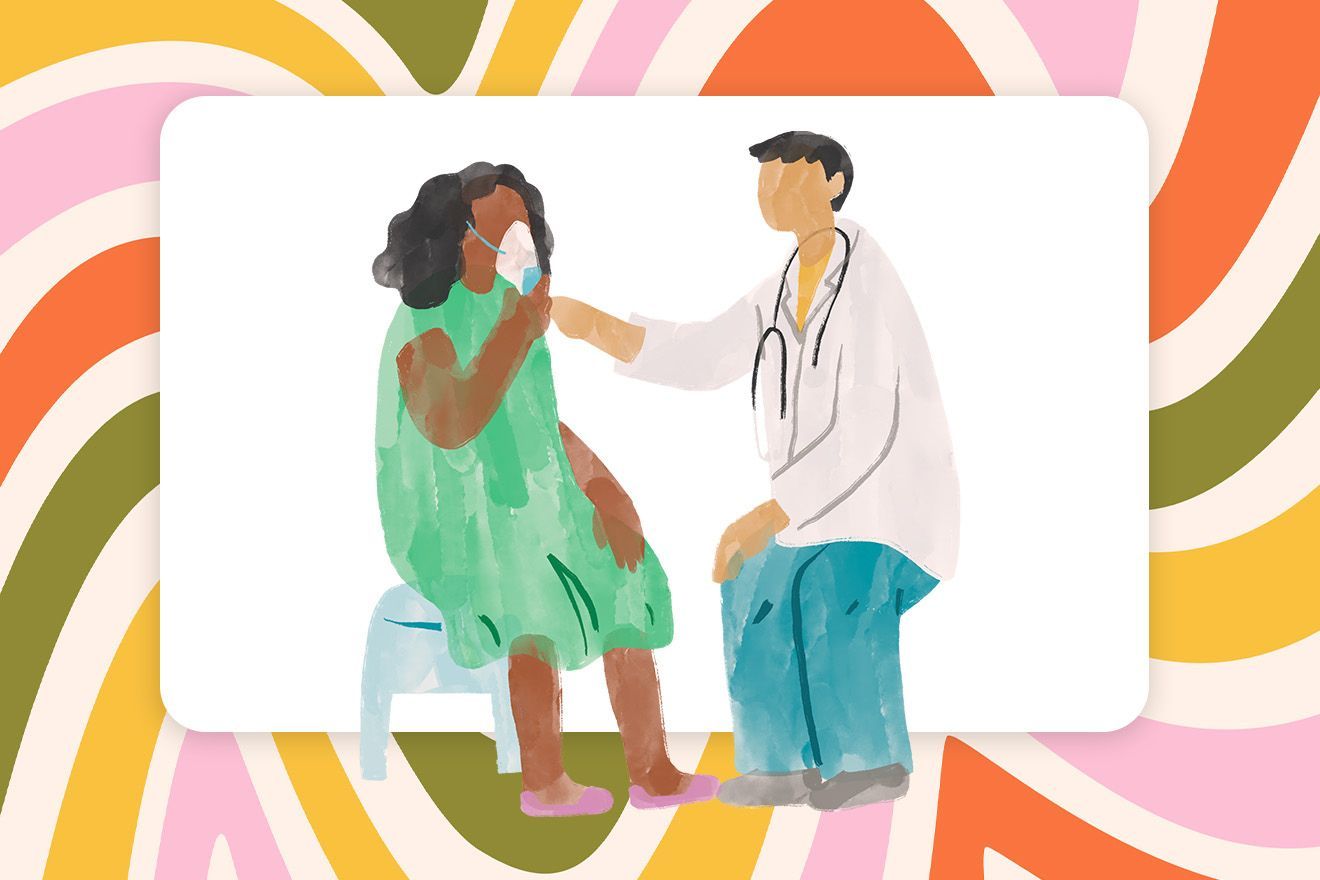Psychedelic therapy is disrupting the common paradigm of mental health treatment. This experiential medicine model has helped people with treatment-resistant depression, PTSD, substance dependency, and more. Current research even suggests that psychedelic therapy can help with long-term physical illnesses as well. Let’s talk about current research into psychedelic therapy and chronic illnesses.1
- Arthritis
- Cancer
- Chronic obstructive pulmonary disease (COPD)
- Coronary heart disease
- Asthma
- Diabetes
- Hepatitis
- Hypertension
- Stroke
- Kidney decline or failure
You’ve probably heard of each of these chronic illnesses before but did you know these physical illnesses have been linked to trauma? People with Adverse Childhood Experiences (ACEs) are more likely to suffer and die from chronic diseases like these. Research suggests that traumatic experiences may put people down a path toward long-term physical health problems,2 but psychedelic therapy could disrupt this process.
At Psychedelic Support, we create the best educational courses for psychedelic therapists. We also help connect people with therapists and professionals with researchers and care teams. No matter where you want to go in psychedelic medicine, we can help you get there.
We’re always curious about new avenues of research and exploration. That’s why this week we’re diving deep into how psychedelic therapy can help people with chronic illnesses.
We know that psychedelics like MDMA have helped people with trauma-based illnesses like PTSD. Could this make psychedelics an asset in chronic illness treatment? Let’s get into the research on chronic illnesses and trauma.
The Link Between Chronic Illnesses and Trauma
Over the last few decades, several studies have emerged revealing a correlation between early trauma and long-term illness.2 Trauma doesn’t just linger in our memories, but in our bodies as well. Some scholars call this “biological embedding,” where an early traumatic event leads to long-term physical ailments.3
Here’s what the progression of biological embedding looks like:
- Childhood trauma, such as abuse, neglect, having a family member who suffers from mental illness, parental divorce, and others.
- Neurodevelopmental Disturbances may cause invisible or overt challenges. These may manifest in attention-deficit disorder, learning problems, acting out, or withdrawing.
- Cognitive and Emotional Problems may lead to anger, sadness, and anxiety.
- Adopting maladaptive, health-harming behaviors in an attempt to soothe. This can look like substance use or alcohol dependency, but it can also be less obvious. Avoidance, passive aggression, and withdrawal are more personality-based examples of maladaptive behaviors.
- Developing chronic disease as a result of maladaptive behaviors. For instance, if a person is avoidant with their health, short-term problems can become long-term. Certain maladaptive behaviors directly lead to chronic illness, like alcohol use and liver problems.
- Increased morbidity and mortality resulting from unmanaged chronic illness.
This progression shows how early trauma in childhood can contribute to chronic illnesses in adults. By affecting the psyche as a person develops in childhood, early trauma has long-term consequences that go beyond mental health.
But what are the physiological processes that support this progression? There are a few reasons why researchers believe this happens:2
- Trauma alters the structure and function of early neurocognition. This is shown in people’s brain volume after they’ve experienced trauma.
- Trauma changes the baseline of our sympathetic nervous system. This leads people to produce more stress hormones after a traumatic event and can lead to insulin resistance.
- Trauma causes systemic changes in the body. The stress response after trauma doesn’t go away once the threat is over. People with early trauma may have immune suppression because of chronic stress inflammation. Their metabolism may be dysregulated, which can lead to problems with weight and diabetes.
- Trauma causes our genes to promote inflammation throughout the body. Pro-inflammatory genes make inflammation resulting from stress hormones even worse.
These processes make it possible for early childhood trauma to lead to chronic illness in adults. Like when a pebble rolls down a snowbank, gathering snow as it falls. The bigger it gets, the more difficult it is to stop it. Childhood trauma amplifies as we develop, deepening into physical and psychological problems.
Could psychedelic therapy disrupt this process? Let’s discuss how psychedelics and integration therapy could help prevent and treat chronic health problems related to trauma.
Using Psychedelic Therapy for Chronic Illnesses
There are two ways that psychedelic therapy could have a positive impact on people with chronic illnesses. Since using psychedelics is an effective treatment for trauma, therapists can help limit the development of chronic illnesses related to ACEs. Psychedelics have also been shown to help people with chronic illnesses gain a new perspective to implement better lifestyle habits. Let’s talk about the research for each of these strategies.
- Psychedelic-Assisted Therapy Treats Trauma at the Root
Psychedelics may help people process and integrate past traumatic experiences, even the deeper and formative ones that happen to us as children. By helping people to assimilate these experiences, psychedelics can help limit the physiology that links trauma to chronic disease.
Follow your Curiosity
Sign up to receive our free psychedelic courses, 45 page eBook, and special offers delivered to your inbox.Instead of allowing chronic physical and psychological stress to progress into diabetes or heart disease, psychedelics can help people modify their risk factors and process their trauma. Recent findings have shown that psychedelics have helped people reduce their feelings of shame with childhood trauma. People who use psychedelics therapeutically have been shown to have fewer symptoms of complex trauma, which could limit the development of chronic illness.4
Learn more about how psychedelic therapy disrupts neurobiological trauma on our blog.
While we know that psychedelics can ease the psychological pain of trauma, we’ve also learned they can help with physical pain. Chronic pain is a long-term physiological process that’s often progressive and debilitating. Yet trials have shown that psychedelics are helpful in treating chronic pain related to cancer, phantom limb pain, and cluster headaches.5
Psychedelic therapy helps people re-orient themselves toward their past and can even help with chronic pain, but these substances can also help people change their behaviors in the future.
- Psychedelic Therapy Helps Form New Health Habits
The most difficult behaviors to change are ones we do every day. Our daily habits are solidified through years of repetition, social and financial pressures, and our own mindsets around health. If you’ve ever tried to change your diet or take up running, you know how hard it is to stick to a new habit. Yet psychedelic therapy helps make people more malleable and open, which could make adopting new health habits easier.6
Behavioral psychedelic therapy is a goal-oriented approach that is new in the field and is promising in the area of chronic illness. This is the study of using psychedelic-assisted therapy to foster intention and habit changes to help people improve their behaviors. These habits center around self-care, nurturing social connections, family life, education, and community.6
The maladaptive, chronic behaviors that contribute to chronic illness often give people feelings of hopelessness and disconnection from the self. Psychedelics can give these people a new perspective by creating neuroplasticity and breaking the rigidity around health habits. People are more open to life changes during and after psychedelic-assisted therapy.7 All of these qualities could make psychedelics important tools in treating chronic diseases in the future.
Psychedelic Therapy for Chronic Illnesses: A New Model for Disease Treatment
The research into psychedelic therapy for physical illnesses is still early, but we’ve seen promising results so far. Psychedelics have proven to be powerful substances for healing depression, trauma, eating disorders, and substance dependency.8 But mental illness doesn’t exist in a vacuum. Physical diseases are linked to psychological ones, which could make psychedelics vital tools in treating chronic physical illnesses as well as mental ones.
Chronic illnesses are just one area of health that psychedelic therapy can help with. If you’d like to learn more about psychedelic therapy, you’ve come to the right place. Psychedelic Support is a proud leader in the education and exploration of psychedelic-assisted therapy. We offer substance courses in ketamine, psilocybin, 5-Me0-DMT, and MDMA, and foundational topics like ethical rights, relationships, and healing the healer. Start with our value-packed free courses page, and be sure to subscribe to our newsletter for updates in your inbox.
References
- Centers for Disease Control and Prevention. (2020, September 17). Prevalence of multiple chronic conditions among US adults, 2018. Centers for Disease Control and Prevention. Retrieved November 23, 2022, from https://www.cdc.gov/pcd/issues/2020/20_0130.htm
- Stawicki, S. P., Firstenberg, M. S., Galwankar, S. C., Miller, A., & Papadimos, T. J. (2021). The Relationship of Adulthood Chronic Disease and Adverse Childhood Experiences (ACEs): Implications Regarding Prevention and Promotion in International Health. In Contemporary Developments and perspectives in International Health Security. essay, IntechOpen. https://www.intechopen.com/chapters/73255
- Berens AE, Jensen SKG, Nelson CA. Biological embedding of childhood adversity: from physiological mechanisms to clinical implications. BMC Medicine. 2017;15(1):135. Available from: http://www.ncbi.nlm.nih.gov/pubmed/28724431
- Healy CJ, Lee KA, D’Andrea W. Using Psychedelics With Therapeutic Intent Is Associated With Lower Shame and Complex Trauma Symptoms in Adults With Histories of Child Maltreatment. Chronic Stress (Thousand Oaks). 2021 Jul 11;5:24705470211029881. doi: 10.1177/24705470211029881. PMID: 34291179; PMCID: PMC8278461.
- Castellanos, J. P., Woolley, C., Bruno, K. A., Zeidan, F., Halberstadt, A., & Furnish, T. (2020). Chronic pain and psychedelics: A review and proposed mechanism of action. Regional Anesthesia & Pain Medicine, 45(7), 486–494. https://doi.org/10.1136/rapm-2020-101273
- Neuhaus EC, Slavich GM. Behavioral Psychedelics: Integrating Mind and Behavior to Improve Health and Resilience. Front Psychiatry. 2022 Mar 14;13:821208. doi: 10.3389/fpsyt.2022.821208. PMID: 35360129; PMCID: PMC8964031.
- Johnson, M. W., Hendricks, P. S., Barrett, F. S., & Griffiths, R. R. (2019). Classic psychedelics: An Integrative Review of Epidemiology, therapeutics, mystical experience, and Brain Network function. Pharmacology & Therapeutics, 197, 83–102. https://doi.org/10.1016/j.pharmthera.2018.11.010
- Bender, D., Hellerstein, D.J. Assessing the risk–benefit profile of classical psychedelics: a clinical review of second-wave psychedelic research. Psychopharmacology 239, 1907–1932 (2022). https://doi.org/10.1007/s00213-021-06049-6







